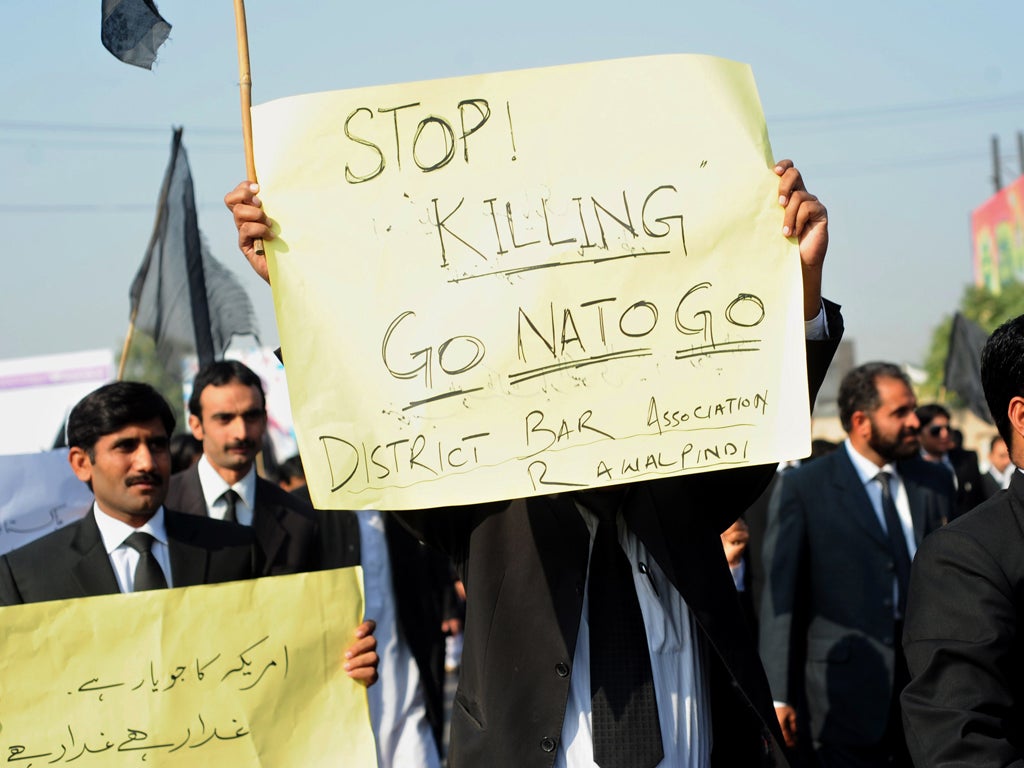Fury at 'deliberate' Nato attack rises in Pakistan
Islamabad denies claims its forces started firing to trigger tragic strike and cuts off Nato supply route

Pakistan has angrily rejected claims that its troops opened fire on Afghan and Nato forces before Nato airstrikes left 24 Pakistani soldiers dead on Saturday. In an escalation of tensions, the Pakistan army has said that the attack was deliberate and unprovoked.
"There was no fire from this direction," said Major General Athar Abbas, the Pakistan military's chief spokesman. "If there was any fire, where are the casualties on their side? Where's the effect of our firing?"
Afghan officials had claimed that the Pakistanis started the firing, forcing them to call for close Nato air support that led to a retaliatory strike.
Gen Abbas also said that Pakistan had already given Nato the coordinates of two border posts that were attacked, 300 metres inside Pakistani territory, dismissing suggestions of a mistake.
The border posts were established in the Mohmand tribal agency after the Pakistan army pushed militants across the border into Afghanistan. Some 24 Pakistani soldiers and officers manned each of the posts.
The Nato airstrike lasted for nearly two hours and continued despite requests for it to be halted, a senior Pakistani military official said. When the attack started, a message was sent up through the chain of command to the army's headquarters in Rawalpindi. At that point, the military official said, the director general of military operations called a Nato commander in Afghanistan and asked him to stop the firing. "There was no response," the military official said. The use of helicopters has been determined, but it is unclear whether Nato jets were involved. The Pakistan army alleges that the precision with which the strike took place is evidence of a jet assault.
Nato says that it is investigating the incident. On Sunday, the Western military alliance's secretary general expressed his regret in a statement. "This was a tragic, unintended incident," said Anders Fogh Rasmussen. "I offer my deepest condolences and sympathy to the families of the Pakistani officers and soldiers who lost their lives..."
In a display of its outrage,Pakistan has cut off the Nato supply routes that run through its territory, ordered the evacuation of the Shamsi airbase used for CIA drones, and threatened to boycott the forthcoming Bonn security conference on Afghanistan.
During episodes of tension with the US, Pakistan has ritually shut off the Nato supply routes, only to reopen them days later. On this occasion, however, the Interior Minister Rehman Malik claimed that they have been "shut permanently". Nato has diminished its reliance on the routes through the Khyber Pass and Chaman, in the south western province of Baluchistan. Now only 40 per cent of non-lethal supplies travel along a journey that once accounted for three-quarters of all supplies.
The tragedy has yielded opposition politicians an opportunity to call on Pakistan to pull out from America's "war on terror". "Pakistan is going to implode if we keep taking instructions from the US," said Imran Khan, the former cricketer whose popularity as a politician is soaring. "This war has radicalised our society and devastated our economy. After this attack, how can a country that has suffered a loss of 40,000 lives continue fighting for an ally that kills its soldiers?"
Angry demonstrators, led by an assortment of militant groups calling for revenge, have taken to the streets of Pakistan's cities . The Pakistani Taliban have exhorted the government and the army to declare jihad on the United States. The army is also under pressure from its middle and lower ranks. Since the 2 May raid that killed Osama bin Laden, they have simmered with rage against what they see as a US violation of their sovereignty and their leadership's weak response.
Join our commenting forum
Join thought-provoking conversations, follow other Independent readers and see their replies
3Comments